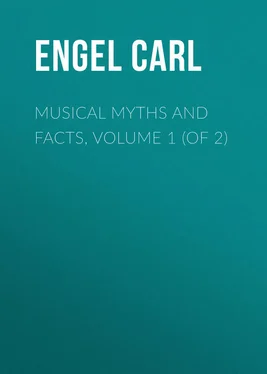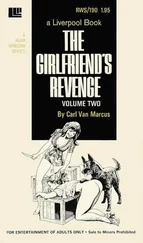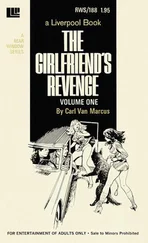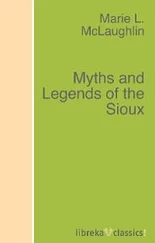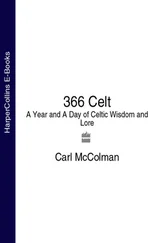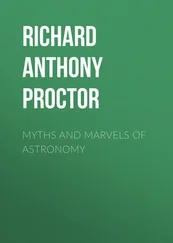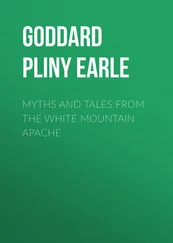Carl Engel - Musical Myths and Facts, Volume 1 (of 2)
Здесь есть возможность читать онлайн «Carl Engel - Musical Myths and Facts, Volume 1 (of 2)» — ознакомительный отрывок электронной книги совершенно бесплатно, а после прочтения отрывка купить полную версию. В некоторых случаях можно слушать аудио, скачать через торрент в формате fb2 и присутствует краткое содержание. Жанр: music_dancing, foreign_antique, foreign_prose, на английском языке. Описание произведения, (предисловие) а так же отзывы посетителей доступны на портале библиотеки ЛибКат.
- Название:Musical Myths and Facts, Volume 1 (of 2)
- Автор:
- Жанр:
- Год:неизвестен
- ISBN:нет данных
- Рейтинг книги:5 / 5. Голосов: 1
-
Избранное:Добавить в избранное
- Отзывы:
-
Ваша оценка:
- 100
- 1
- 2
- 3
- 4
- 5
Musical Myths and Facts, Volume 1 (of 2): краткое содержание, описание и аннотация
Предлагаем к чтению аннотацию, описание, краткое содержание или предисловие (зависит от того, что написал сам автор книги «Musical Myths and Facts, Volume 1 (of 2)»). Если вы не нашли необходимую информацию о книге — напишите в комментариях, мы постараемся отыскать её.
Musical Myths and Facts, Volume 1 (of 2) — читать онлайн ознакомительный отрывок
Ниже представлен текст книги, разбитый по страницам. Система сохранения места последней прочитанной страницы, позволяет с удобством читать онлайн бесплатно книгу «Musical Myths and Facts, Volume 1 (of 2)», без необходимости каждый раз заново искать на чём Вы остановились. Поставьте закладку, и сможете в любой момент перейти на страницу, на которой закончили чтение.
Интервал:
Закладка:
Again, the student must be prepared for disappointment, should he have to consult any of our scientific treatises on music. However, there may be more works relating to the science of music in the Library of the British Museum than would appear from the catalogue of music. Several have evidently been entered in the new General Catalogue. Would it not be advisable to have all the books relating to music entered in the musical catalogue? Even the most important dissertations on musical subjects which are found in various scientific works might with advantage be noticed in this catalogue. Take, for instance, the essays in the 'Asiatic Researches,' in the works of Sir W. Jones and Sir W. Ouseley, in 'Description de l'Egypte,' in the 'Philosophical Transactions.'
Thus much respecting the Musical Library in the British Museum. Let us now consider how a national musical library ought to be constituted. Premising that it is intended as much for the use of musical people who resort to it for reference, as for those who are engaged in a continued study of some particular branch of the art, the following kinds of works ought to form, it would appear, the basis of its constitution.
1. The Scores of the Classical Operas, Oratorios, and similar Vocal Compositions, with Orchestral Accompaniments. – Many of these scores have not appeared in print, but are obtainable in carefully revised manuscript copies.
2. The Scores of Symphonies, Overtures, and similar Orchestral Compositions. – The editions which have been revised by the composers themselves are the most desirable. The same remark applies to the scores of operas, oratorios, etc.
3. Vocal Music in Score. – The sacred compositions Alla Cappella , and the madrigals of the old Flemish, Italian, and other continental schools, as well as those of the celebrated old English composers. The choruses of the Greek Church in Russia, etc.
4. Quartets, Quintets, and similar Compositions in Score. – The study of these works of our great masters is so essential to the musician, that special care should be taken to secure the best editions. The classical trios for pianoforte, violin, and violoncello, and some other compositions of this kind, originally published in parts, have more recently been issued in score. The latter editions are greatly preferable to those in which the part for each instrument is only printed separately. The same remark applies to the concertos of Mozart, Beethoven, and other masters, which have been published with the orchestral accompaniment in score, as well as with the orchestral accompaniment arranged for the pianoforte or for some other instruments.
5. Sonatas, Fantasias, Fugues, etc. – Of all the classical works composed for a single instrument, the original editions, generally revised by the composers themselves, are indispensable. Besides these, the most important subsequent editions of the same works would be required. Beethoven's pianoforte sonatas, for instance, have been re-edited by several eminent pianists. It is instructive to examine the readings of these musicians, which differ in many points from each other.
6. Arrangements. – Those of operas, oratorios, masses, and other elaborate compositions with orchestral accompaniment, must necessarily be confined to the instrumental portion, otherwise they are useless either for study or reference. Those arrangements are greatly preferable which have been made by the composers themselves, or under their superintendence.
7. National Music. – All the collections of national songs and dances which have been published in different countries. The advantage which the musician might derive from a careful study of them is not yet so fully appreciated as it deserves; but it would probably soon be better understood, if these treasures were made more easily accessible.
9. Works on the Theory and History of Music. – All the standard works ought to be found in the library, not only in the languages in which they were originally written, but also in translations, if any such exist. Many of the latter are valuable, on account of the explanations and other additions by the translators. This is, for instance, the case with some English books which have been translated into German; as Brown's 'Dissertation on the Rise, Union, and Power of Music,' translated by Eschenburg; 'Handel's Life,' by Mainwaring, translated by Mattheson, etc. It need scarcely be added that the biographies of celebrated musicians ought also to be included among the desirable requisites.
10. Works on Sciences intimately connected with the Theory of Music. – Treatises on acoustics, on the construction of musical instruments, on æsthetics, etc.
11. Musical Journals. – All the principal ones published in different countries and languages. To these might advantageously be added the most important literary journals containing critical and other dissertations on music.
12. Dictionaries, Catalogues, etc. – The English language possesses no musical dictionary, technical, biographical, or bibliographical, similar to the French and German works by Fétis, Schilling, Gerber, Koch, Rousseau, and others, which are indispensable for the library. With these may be classed the useful works on the Literature of Music compiled by Forkel, Lichtenthal, and Becker, as well as Hofmeister's comprehensive 'Handbuch der musikalischen Literatur.' The collection of catalogues should comprise all those of the principal public musical libraries on the Continent and in England; those of large and valuable private libraries, several of which have appeared in print, – as, for instance, Kiesewetter's 'Sammlung alter Musik,' Becker's 'Tonwerke des XVI. und XVII. Jahrhunderts,' and others; those of the principal music-publishers, and those of important musical libraries which have been disposed of at public auctions.
There is no necessity for extending this list any further, as it will suffice to indicate the plan which, in my opinion, ought to be pursued in the formation of a national musical library. I shall therefore only observe further that there are, besides the above mentioned, several kinds of works which can scarcely be considered as of secondary importance, such as musical travels, novels, and entertaining as well as instructive musical essays; librettos of operas, and the poetry of other elaborate vocal compositions; drawings illustrating the construction of musical instruments, – as, for instance, of the most celebrated organs, of the various improvements in the pianoforte, etc.; engravings from the best portraits of celebrated musicians; faithful sketches from sculptures and paintings of nations of antiquity in which musical instruments and performances are represented, etc.
There remains yet another point which requires a moment's consideration, – namely, the daily increasing difficulty of forming such a library as has just been planned. The interest in the study of classical works relating to music is no longer confined to the professional musician, but is spreading among amateurs and men of science. Their libraries now absorb many of the old and scarce works which formerly were almost exclusively in the hands of musicians. Moreover, the English colonies have already drawn upon our limited supply of the old standard works, and there is every reason to suppose that the demand for them will continue to increase. Many of these works have evidently been published in an edition of only a small number of copies. Still it is not likely that they will be republished. In a few instances where a new edition has been made, it has not apparently affected the price of the original edition, because the latter is justly considered preferable. To note one instance: the new edition of Hawkins' 'History of Music' has not lessened the value of the first edition, the price of which is still, as formerly, on a par with the price of Burney's 'History of Music' of which no new edition has been published. About ten years ago it was possible to procure the original scores of our old classical operas, and other works of the kind, at half the price which they fetch now, and there is a probability that they will become every year more expensive. Indeed, whatever may be the intrinsic value of any such work, the circumstance of its being old and scarce seems sufficient, at least in England, to ensure it a high price.
Читать дальшеИнтервал:
Закладка:
Похожие книги на «Musical Myths and Facts, Volume 1 (of 2)»
Представляем Вашему вниманию похожие книги на «Musical Myths and Facts, Volume 1 (of 2)» списком для выбора. Мы отобрали схожую по названию и смыслу литературу в надежде предоставить читателям больше вариантов отыскать новые, интересные, ещё непрочитанные произведения.
Обсуждение, отзывы о книге «Musical Myths and Facts, Volume 1 (of 2)» и просто собственные мнения читателей. Оставьте ваши комментарии, напишите, что Вы думаете о произведении, его смысле или главных героях. Укажите что конкретно понравилось, а что нет, и почему Вы так считаете.
